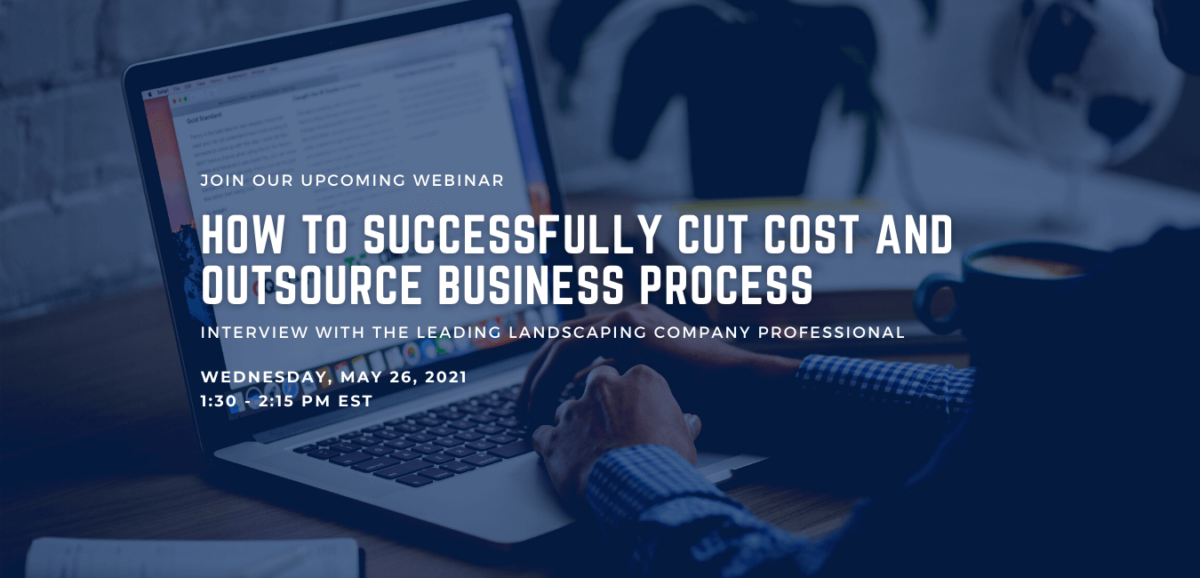In the discussions on outsourcing an offshoring at times Landscape and Lawncare businesses don’t think of themselves as outsource providers. In fact the core of the service industry is to outsource non-strategic activities from say a University or HOA to an expert like a commercial/residential landscaper.
Oftentimes Landscapers don’t take advantage of the same opportunities for their internal operations. As we close down on the summer the labor shortages are becoming more acute and more challenging. That is where Process-Smart can help.
Core activities:
- Accounts Payable
- Scheduling Support
- Invoice Support
- First level customer service support
- Marketing lead generation
Following is an article by Mihifeld & Associates going in-depth on outsourcing in case you are interested. Bottom line, just like you help your clients with expertise and focus, leveraging an offshore provider of administrative services can free you to build and retain your business. Please give us a call or send an email, and we can walk you through the Process-Smart opportunity.
Defining Outsourcing
Many Americans have an unfavorable view of outsourcing. The older generations commonly mistake outsourcing for offshoring. Younger generations grew up hearing outsourcing used in the same sentences as job losses, layoffs, or companies moving departments to foreign countries. Additionally, many Millennials and Gen X’ers remember the original NAFTA discussions in the 1990’s and there are as many who viewed it negatively at the time as there are who viewed it positively. All across the region commonly referred to as the “Rust Belt” the word outsourcing is a four-letter word.
However, outsourcing is one of the best strategies a business can employ to keep jobs local are at least in the US. From the start, let’s clear up the major differences between outsourcing and offshoring so we are on the same page moving forward.
Outsourcing is when an organization contracts a non-affiliated business to complete work for their business. Outsourcing is primarily done when an organization requires specific skills or specialized machinery to complete some action or product that is not central to the core of the organization.
Example: When companies hire firms to design and build their website, do their accounting, manage their landscaping – they are outsourcing.
Offshoring is when an organization relocates a department or portion of their business to a foreign country. The number one agenda in offshoring is to lower costs by taking advantage of the circumstances in another country. Many developing nations have fewer environmental regulations, looser labor laws, and lower wage expectations and for those reasons, offshoring is an attractive option.
Example: When there was a surge of companies moving their customer service call centers to India, Philippines, Malaysia, and so on – that was offshoring.
You Are Already Outsourcing
A few all too common phrases that are usually inaccurate:
- “Our company doesn’t outsource”
- “We do everything in house”
- “We have never outsourced”
- “The owner/president doesn’t work with third parties”
The overwhelming chances are your company is already outsourcing jobs and you just don’t realize it or never thought of it as outsourcing. Think about all the departments in your whole company, now think about all of the responsibilities and resources of that department, are any of those responsibilities or resources carried out or provided by someone who doesn’t work directly for your company? Here is quick list of the most commonly outsourced responsibilities people often overlook.
- Are you shipping any kind of product?If you don’t own your fleet of trucks and have drivers on your payroll then you are already outsourcing your transportation and freight.
- Do you have a website?Websites require constant maintenance and it is often much more affordable to have a 3rd party host and maintain a website than keep someone on the payroll for that sole purpose.
- Who balances the books?It is very common for businesses to use accounting firms to handle their financial reporting, tax preparation, and even payables and receivables.
- Who cuts the grass?The majority of businesses hire a landscaper. It is not financially responsible to purchase lawnmowers, pay for upkeep, and maintain people on the payroll just to cut the grass once a week and spread the mulch.
- Do you Market or Advertise?Many companies do have a marketing team, but very few have an advertising team. Simple difference, Marketers study analytics to see what medium will have the greatest impact (tv, radio, internet) with what message (the actual content) – Advertisers make the commercials and ads. Most companies do not employ actors, graphic artists, or photographers to make all of their advertising in house.
- Where do you get your talent? One incredibly important area, and often outsourced responsibility is recruitment. Who is hiring your new associates? Where are they finding them? How are they selecting the best candidates? Almost every HR department is outsourcing some part of the hiring process whether it is finding qualified candidates or hiring a recruitment agency to handle the whole process. Another option that is very commonplace is companies who only hire from temporary agencies. That way every new employee starts on a temporary basis and is eligible for full employment after a pre-determined amount of time.
Why You Should Outsource More
It is easy to make the business case why outsourcing is a great strategy. The common business ethos is if you aren’t growing, you are dying. Removing from the equation any industry that is currently on the way out, all businesses, public and private, are expected to grow. There are different goals for growth such as revenue, market share, locations, and so on – but measurable growth nonetheless. Outsourcing specific functions will have an immediate and long term impact on growth. Here is a quick list of guaranteed benefits from outsourcing.
- Easy Access to Industry Professionals– You do not have to scout, hire, and rollout the red carpet for the most knowledgeable professionals in an industry that is not core to your business. You can rent them! If your company makes widgets, you will benefit from having great widget engineers and widget production professionals on board to make the best widgets you can make. However, you do not need to recruit and hire the leading authorities in supply chain management to move your widgets. It can be a far more cost effective and an overall better strategy to outsource your transportation logistics to a company who only works in that industry. If you want the best, you don’t have to hire the best – you can just partner with the best for the same results but with a cheaper price tag.
- Grow Abilities Without Spending Capital– Perhaps you have no trouble growing your business, but you are experiencing the best of problems; you are having trouble keeping up with demand. We are in a great period of economic growth and many businesses are competing for resources to meet demands. Is it better to tie up a huge amount of capital to expand your operation or bring on a third party to help grow your current abilities? This is a calculated decision the ROI department has to review thoroughly. The majority of the time, the safest route is to bring on a third party to help with current operations and reinvesting that capital in new R&D to stay ahead of the competition.
- Increase Your Workforce, Not Your Payroll– Continuing the theme of getting the right human capital in the right places, there are very few limits to how a business can maximize the abilities of its workforce through outsourcing. Whether the goal is to hire an ultra-specialized consulting firm to provide a specific solution to a complicated problem or work with a temp agency to fill 100 new factory positions that could become full-time positions in the future, you get the benefits of those workers without adding them to the payroll. That is not to say they are free, but the cost is much more affordable than having to hire all of these extra positions at once as company employees with all of the applicable taxes and benefits required.
- Access Resources Without Buying Them– While human capital is usually the largest business expenditure, resources and technology add up quickly. There are new hardware and software offerings regularly as the level of technology grows exponentially. Buying a brand new technology solution now may leave you holding an obsolete tool before you even pay it off. Outsource the resources that are not necessary to the core purpose of your business. If you are a commercial printer company, it makes perfect sense to buy that $100,000 commercial printer. However, does it make sense to start your own paper mill and build an ink factory? Your business is printing, not making paper and ink. The core of your business is your specialty; let someone else’s specialty work for you.
Outsourcing and the Individual
In the previous section we discussed the business case for outsourcing – the personal case is very much the same. Every business relies on some other organization as either a supplier, retailer, or a customer – you are not operating within a vacuum. Many people enter specific industries because they have a passion for it. There are not only businesses, but whole industries that rely on outsourcing. When your company outsources something like landscaping, web design, or logistics planning they are not killing jobs by not hiring people to do those things in house – they are creating jobs by supporting businesses who specialize in those things.
The most talented individuals in a field often want to work for the best companies in that field – they don’t want to work for a company who just needs someone in that field.
Example: The top of class graduates from Ivy League Law Schools often join the most prestigious law firms rather than take in house counsel positions for SMBs. If you need the best attorney, you better call one of those firms.
Everyday Professionals working in blue collar jobs also thrive when your company outsources. Most locally-owned businesses rely on outsourcing.
Example: There is a cornucopia of everyday professionals who count on you to outsource to their locally-owned small business. When the sinks and commodes back up you need that plumber. The AC or Furnace needs maintenance you need that HVAC professional. Breakers blow or outlets go dead and you need an electrician.
There is absolutely nothing wrong with outsourcing if you partner with the right person for the right job.
Still Weary of Outsourcing – Try Partsourcing
Something many people take for granted are the subtle complexities of euphemisms. There is quantifiable data showing the uptick in the used car market when dealerships changed the terminology from “used car” to “pre-owned vehicle.” The idea being that “used” had a negative tone that made it sound as if the car was worn down and “pre-owned” made it sound as if the car was the same as new except the title had been in a person’s name before – that is no big deal – you can’t drive the title. However, at our core we know the product, regardless of terminology, is the same product. Numbers don’t lie though, people prefer pleasant terms.
With an appreciation of the subtle complexities of euphemisms and the hope people will ignore their bias against outsourcing, M&A presents the term: partsourcing.
Partsourcing – is when your business partners with a third-party company to have them fulfill part or all of the work associated with a specific area of your business.
Example: J&P’s Widgeters just partsourced many logistics functions to Mihlfeld & Associates, Inc.
Real Outsource Partsource Examples
Apple Inc. is one of the best examples of Partsourcing. From the beginning, Apple has maintained they are a design company – not a manufacturer. They have always partsourced all of their manufacturing and over the years have taken some flak for it because they partsourced internationally. However, Apple maintains there are no manufacturing companies in the US that can do what they need done, and they aren’t going to build those factories because they are not manufacturers. It is an interesting position, and one that perfectly illustrates how some companies define themselves and why they need to partsource. Obviously, Apple is one of the most successful companies in recorded history so this has proven to be a great decision for Apple.
Amazon decided to partsource their inventory management after 18 years in business. The online powerhouse always had one goal and that was to please customers with a hassle-free online purchase. Because the whole business revolved around buying and selling inventory, inventory management was key to Amazon’s success. However, with a refocus on e-commerce, delighting customers, and growing in markets and offerings, Amazon decided to partsource a large part of their inventory management. Again, an obvious success for Amazon as they continue to grow and challenge other retailers on every front.
Wrapping it Up
If the two first trillion dollar companies both outsource huge parts of their operations there has to be some merit in its efficacy. If organizations as large as Apple and Amazon outsource help, then it is fair to say that SMB’s should outsource help as well to stay competitive in their industry.
Maybe you built your own business from the ground up. Doing what you did to get to this point, probably won’t get you to where you want to go next. You go to the doctor when you get sick; you don’t make someone in your family go to medical school and then wait for him/her to treat you ‘in house.’ Businesses outsource every day and more often than not, it pays off. All you need is to know what needs to be done and who is the best person for the job.





